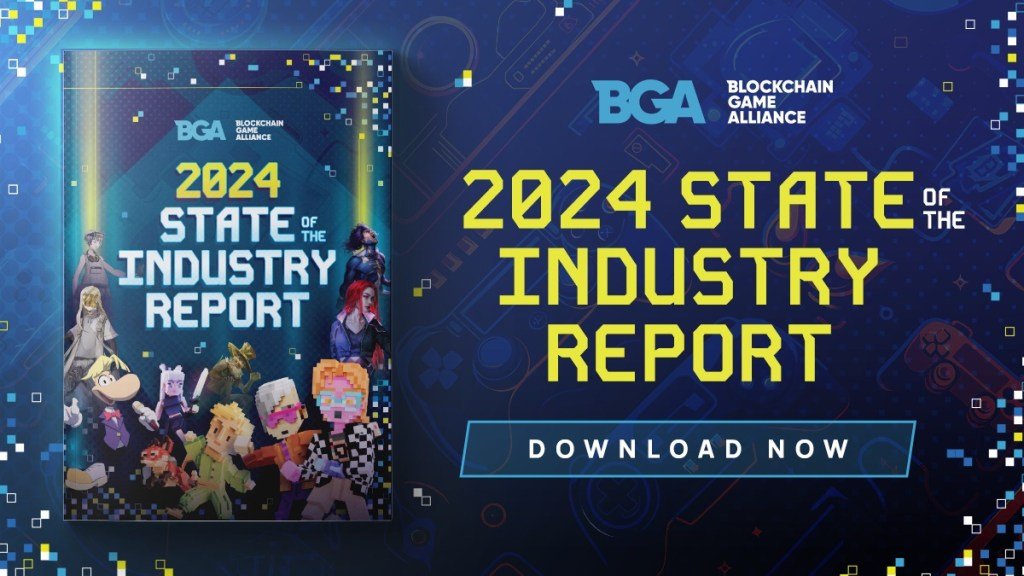According to this, more professionals in the field of blockchain gaming now come from the gaming sector than from any other field Blockchain Game Alliance (BGA) 2024 State of the Industry Survey and report.
Over half of respondents (52.5%) said they had gaming expertise, which is the highest proportion recorded since the survey began in 2021.
In contrast, blockchain or cryptocurrency specialists now make up just 10.8% of the field, a significant decline from 21.7% in 2023. For an industry that has been beset by the importance of developing games with fun at the forefront The fourth annual report states that there is an increasing prevalence of professionals with a gaming background as opposed to blockchain or cryptocurrencies.
The report also shows that owning digital assets continues to be the biggest benefit of integrating blockchain technology into games, with 71.1% of respondents citing it as such. This has been the top benefit among industry experts since the first survey in 2021.
Subsequently, four out of ten respondents said that new reward and revenue models for players were the second biggest benefits that blockchain can bring to gaming. Many respondents highlighted earning and incentive systems for players that are only possible through Web3 technology.
According to 53.9% of respondents, onboarding and poor user experience remain the biggest challenge in the blockchain gaming industry. However, this number has dropped significantly from 79.5% in 2023. The data reflects the industry’s focus on making Web3 games more accessible, with many putting the more technical blockchain aspects in the background.
As for the negative aspects, 23.8% of respondents said they find the crypto winter a headwind. Another 17.3% said the ban on NFTs on traditional games and platforms was another setback. About 14.9% cited macroeconomic events, 6.3% said security and threat protection were negative, and 6.1% said regulatory developments were difficult.
“In 2024, we have seen real progress in making blockchain gaming more accessible, and now industry experts say onboarding is less of a barrier than last year,” said Sebastien Borget, President of the BGA and COO of The Sandbox, in an explanation. “Another big change, according to our survey results, is that more and more professionals with a background in traditional gaming are coming to Web3 instead of crypto, and that is influencing the types of games being developed, especially those that are fun and addictive Experiences take precedence.” Complexity. The success of platforms like TON (on Telegram) shows how simple, accessible games can really drive mass adoption.”
The report also showed that the industry continues to battle misconceptions: 66.3% of respondents said they still face accusations that blockchain gaming is a scam or a pyramid scheme, the report said. A new misconception that has gained traction in 2024 is that Web3 gaming is full of bots, which was identified by 29.5% of respondents.

Overall, interest in blockchain gaming increased in 2024, with three times more participants compared to the 2021 survey. However, gender diversity remains an ongoing challenge, with only 17.3% women represented among respondents.
“As the market recovery continues, we are witnessing the remarkable resilience of our industry. This year has brought significant advancements in world-class gaming and strategic collaborations between leading Web2 companies and blockchain ecosystems,” Borget said in the report. “There is a clear sense of confidence in our annual survey: more than eight in 10 respondents said they do
We are committed to remaining in the industry next year, signaling our unwavering commitment to our progress.”
Borget noted that blockchain gaming has also expanded its reach globally, with strong growth seen in South America, the Middle East and Africa. This represents a significant change from the early years of the survey.
At the heart of this growth is the principle of player empowerment. Owning digital assets remains a cornerstone, with 71.1% of respondents seeing it as the single biggest benefit blockchain gaming offers. “Experimentation with new revenue and reward models continues to be a priority for developers, reflecting our ongoing commitment to creating games and virtual economies that place legitimate value on player engagement while being demonstrably robust and sustainable,” said Borget.
“Finally, our focus on gender diversity has shown that female participation is increasing encouragingly after a declining trend,” said Borget. “But we are nowhere near where we want to be in terms of female representation in the BGA, so we continue our work to ensure we include and represent all groups in our industry. Together we are building an industry that empowers gamers, drives innovation and reshapes the future of gaming.”
Traditional games and IPs moving to Web3 were cited as having the largest positive impact on Web3 gaming in 2024 at 18.6%, an increase from 2023 when it was second at 15.2%. This is followed by traditional studios creating new IPs on Web3 in 2024 at 15.7%, falling from their previous top spot in 2023 at 19.8%. From 2023 to 2024, the percentage of survey respondents who referred to traditional game studios remains unchanged at around 34%.
Web3 gaming predictions in 2025
When it comes to predictions for 2025, respondents expect consolidation of blockchains and infrastructure into fewer alternatives. In order to survive, many of these infrastructure projects will choose to consolidate, either merging with other smaller companies or being acquired by a larger company.
Web3 is also expected to run in the background and not be displayed openly, as was the case with the first generation of play-to-earn games. The prevailing opinion is that most people entering the Web3 gaming space are primarily focused on the gaming experience and have limited interest in the underlying technical details. Since the last market cycle, more effort has been put into UX and UI, with an emphasis on a seamless experience, similar to what gamers would expect from Web2 games.
And AI is expected to enable new and personalized gaming experiences. Many game developers have explored the applications of AI, primarily used for data collection and analysis, although some have also explored generative AI for development. With the emergence of fully on-chain gaming and autonomous worlds, AI will continue to become a core foundation of gaming. AI that collects data from players can evolve to enable personalized experiences ranging from providing recommendations based on player behavior to customizing in-game interactions.
The industry expects that the interoperability of blockchain gaming infrastructure will also be improved. Interoperability will evolve from a technical feature to a cornerstone of gaming identity, fostering connected economies, collaborative storytelling and a unified sense of progress across the metaverse.
Finally, decentralization is expected to make its way into e-sports as well. Esports competitions have always been centralized systems in which key organizers and game developers had authority over all major decisions. These entities often determine the direction of a game’s competitive scene, including the format, qualified teams, and prize pool of tournaments. Decentralizing these systems could create esports that are more aligned with community interests. You can include more teams, vote to change the format and contribute to prize pools. Decentralized e-sports will open up more gaming opportunities.
methodology
The annual BGA State of the Industry Report has been created, analyzed and compiled by Web3 consulting firm Emfarsis for the fourth year, a task the company has undertaken since the BGA was founded. The report covers introduction, career, innovation, growth and other key developments.
To make the report more comprehensive, respondents include professionals from the various fields of Web3 gaming, from content creators to journalists, C-level executives, government officials, researchers, investors and more. The results provide insight into the current state of blockchain gaming and its evolution over the next year.
In 2024, the BGA conducted an industry survey for the fourth consecutive year with consulting firm Emfarsis, which included 19 questions about careers, industry growth, acceptance and challenges. The survey ran from August 21 to September 29, 2024 and was distributed via the BGA member database, LinkedIn, email, X and Telegram. Additional answers were collected at events such as Gamescom Cologne and TOKEN2049. Of 716 responses, 93 were excluded as incomplete, leaving 623 valid responses
for analysis.
The 2024 survey received 623 valid responses, an 18.4% increase from 2023 and nearly triple the previous year.
The Blockchain Game Alliance (BGA) is an organization committed to promoting blockchain in the gaming industry. The BGA’s goal is to raise awareness of and encourage adoption of blockchain technologies by highlighting their potential to promote new ways to create, publish, play, and build strong communities around games. The group has 350 members in 50 countries.
Source link






